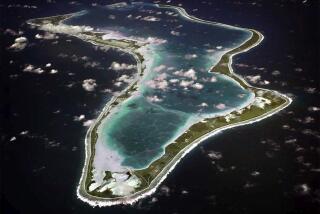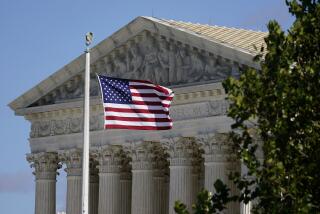Britain Illegally Expelled Chagos Islanders for U.S. Base, Court Rules
LONDON — The British government illegally expelled nearly 2,000 inhabitants of the Chagos islands in the Indian Ocean at the height of the Cold War to make way for a strategic U.S. military base on Diego Garcia, the High Court ruled here Friday.
The judges overturned a 1971 immigration order banning the Ilois islanders from their native lands and decided that the exiles--now numbering about 4,500 with descendants, according to their attorneys, and living in Mauritius and the Seychelles--have a right to return to the 65-island archipelago.
“For us, it is a historical day to win this fight. It seems like David and Goliath,” said Olivier Bancoult, chairman of the Chagos Refugee Group in Mauritius, who was exiled in 1968 at the age of 4. “We all think about returning, and we want compensation for all we have been suffering.”
The British government said it will not appeal the decision and will complete an ongoing feasibility study on resettling the exiles.
The U.S. government is not party to the suit. In Washington, the Pentagon reacted warily to the ruling.
“The United States does have a strategic interest on Diego Garcia,” said a Defense Department official who asked not to be named because of the sensitivity of the case. “But this is a matter between the British authorities and the individuals who brought the case. We have no comment on the merits of the case.”
The official added, however, that Diego Garcia “has played a primary role in the support of naval and Air Force units operating in the Indian Ocean and the Persian Gulf.”
U.S. units responding to Middle East crises have used the base to refuel. The Air Force and Marine Corps store heavy equipment on Diego Garcia for use in the event of a Middle East emergency. U.S. warplanes based on the island flew missions during the 1991 Persian Gulf War.
“It’s one of the two or three single most important U.S. military bases in the world,” said Michael O’Hanlon, a defense policy expert at the Brookings Institution, a Washington think tank.
Bancoult’s attorney, Richard Gifford, said the U.S. government filed a statement during the hearing opposing the islanders’ return to the archipelago on the grounds that it would be a “threat to national security,” despite a distance of more than 130 miles between the air base and the nearest island.
The case of the exiled islanders is seen by many here as a sad chapter of Britain’s colonial past and Cold War history. It has been an embarrassment for British Foreign Secretary Robin Cook, who expressed outrage at the eviction as a young member of Parliament when the story first came to light in 1975--then had to send attorneys to defend the action in the High Court hearing in July.
The Foreign Office said after the decision that “the government has not defended what was done or said 30 years ago” and, as the court recognized, “made no attempt to conceal the gravity of what happened.”
The Chagos islands were separated from Mauritius in 1965 and became a new colony called the British Indian Ocean Territory. The deal with then-Labor Prime Minister Harold Wilson led to Mauritius’ independence three years later.
About 1,500 miles south of India, in a region of interest to China and the Soviet Union, the territory was leased in 1966 to the United States for use as an air and naval base for 50 years.
The U.S. government reportedly gave Britain a multimillion-dollar discount on its U.S.-made Polaris nuclear weapons system as payment for use of the islands. A memo from Foreign Secretary Michael Stewart to Wilson in 1969 admitted that the U.S. payment for use of the islands was kept secret from Parliament and the U.S. Congress.
But the United States wanted a land without people, and the islands were depopulated by stealth between 1967 and 1973, according to information revealed in a U.S. congressional investigation in 1975 and in Foreign Office documents declassified after 30 years and introduced in the case.
Although some of the islanders--descendants of African and Indian plantation workers--had lived there for generations, Britain asserted that they were temporary migrants and therefore could be removed without concern for their rights.
Paul Gore-Booth, a senior Foreign Office official in 1966, wrote to a diplomat, “We must surely be very tough about this. The object of the exercise is to get some rocks which will remain ours. . . . There will be no indigenous population except sea gulls. . . .”
Residents who left the island for any reason were prevented from returning. The remaining inhabitants eventually were evicted to Mauritius and the Seychelles, where they failed to adjust to city life. Most remained on the fringes of society, poor and uneducated.
Bancoult recounted how his 11-member family went to Mauritius in 1968 so that his ill sister could see a doctor.
After she died, the family tried to return home, “but we were told the land had been given to the Americans for a U.S. military base.”
He recalled wanting to take to Mauritius a drum that his grandfather had given him but was told to leave it behind. “We couldn’t carry all of our belongings, and we were thinking we would go back,” he said.
An electrician with three children of his own now, Bancoult said he hopes he will be allowed to go home “and put flowers on my grandparents’ graves.”
In the decision, Lord Justice John Laws told the court that banishing the islanders had been an “abject legal failure” by the British government. The court said the government had used excessive zeal in removing the population, even when judged by the standards of the colonial times.
Gifford, Bancoult’s attorney, said he was uncertain how the government ultimately would comply with the court ruling, whether the exiles would be allowed to return to their native islands or be relocated on the islands farthest from Diego Garcia, or whether they ultimately would be asked to remain abroad and receive compensation.
“We are ready to negotiate,” Gifford said.
O’Hanlon, the U.S. defense expert, said the impact of the decision will depend on whether returning islanders are allowed to live anywhere they wish. He said it appears possible that restrictions could be applied to residents to prevent them from interfering with operations at the military base.
In the absence of such restrictions, O’Hanlon said, the ruling could limit future military operations at Diego Garcia.
“It could be a major hindrance,” he said.
*
Times staff writer Norman Kempster in Washington contributed to this report.
More to Read
Sign up for Essential California
The most important California stories and recommendations in your inbox every morning.
You may occasionally receive promotional content from the Los Angeles Times.










